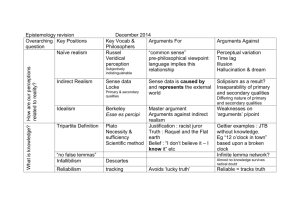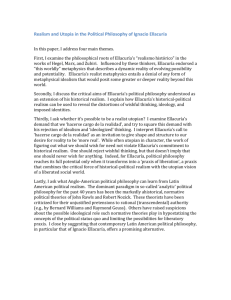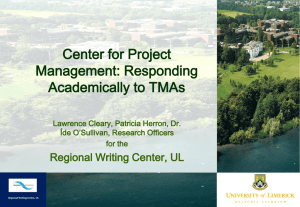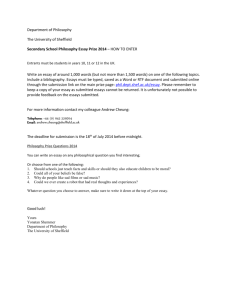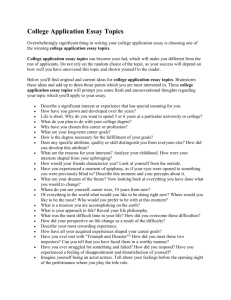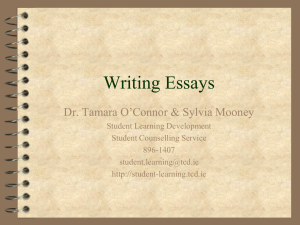Philosophy 501 Introduction to Philosophy of Science
advertisement
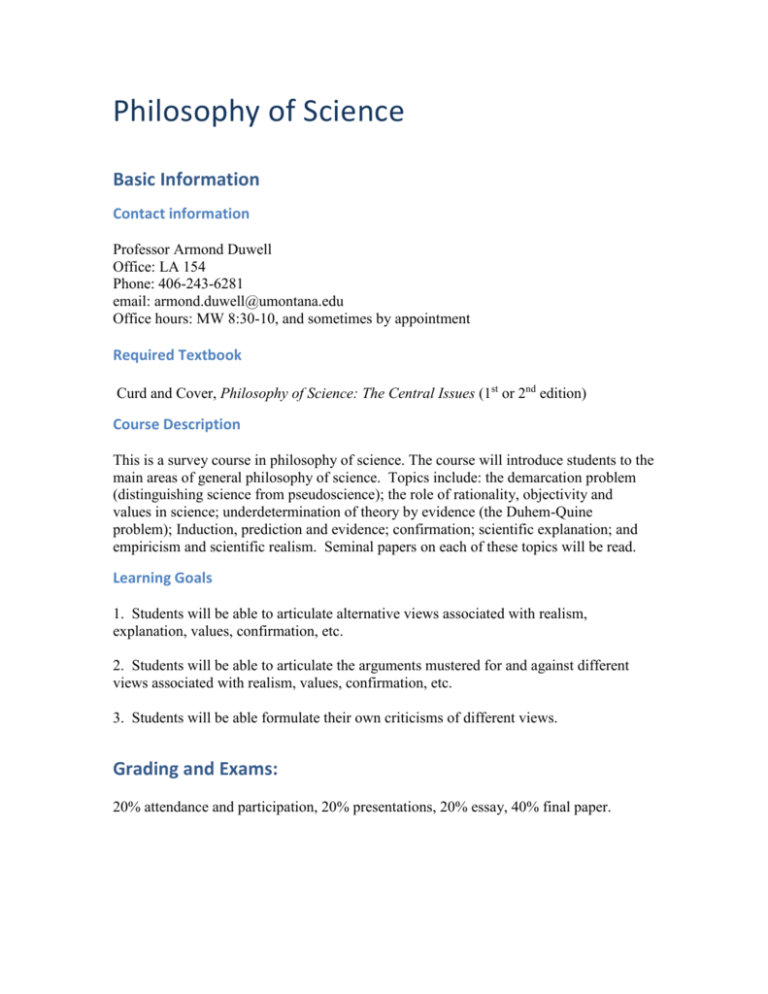
Philosophy of Science Basic Information Contact information Professor Armond Duwell Office: LA 154 Phone: 406-243-6281 email: armond.duwell@umontana.edu Office hours: MW 8:30-10, and sometimes by appointment Required Textbook Curd and Cover, Philosophy of Science: The Central Issues (1st or 2nd edition) Course Description This is a survey course in philosophy of science. The course will introduce students to the main areas of general philosophy of science. Topics include: the demarcation problem (distinguishing science from pseudoscience); the role of rationality, objectivity and values in science; underdetermination of theory by evidence (the Duhem-Quine problem); Induction, prediction and evidence; confirmation; scientific explanation; and empiricism and scientific realism. Seminal papers on each of these topics will be read. Learning Goals 1. Students will be able to articulate alternative views associated with realism, explanation, values, confirmation, etc. 2. Students will be able to articulate the arguments mustered for and against different views associated with realism, values, confirmation, etc. 3. Students will be able formulate their own criticisms of different views. Grading and Exams: 20% attendance and participation, 20% presentations, 20% essay, 40% final paper. Attendance Attendance is mandatory. You get two unexcused absences. Additional unexcused absences will incur 5% reduction in final grade up to a total of 10%. Absences will be excused after the fact only in case of extreme circumstances that could not have been anticipated. Moreover, proof of extreme circumstances is required. Absences may be excused before the fact and is up to my discretion. In all cases, please talk to me about any foreseeable problems as soon as you anticipate them. I'm far more lenient when you are forthright about your problems. Participation Active participation is essential for learning philosophy. Our primary purpose in this class is to explore conceptual space by means of rational argumentation. I want to hear from you. A range: The student is fully engaged and highly motivated. This student is well prepared, having read the assigned texts, and has thought carefully about the texts' relation to issues raised in lecture and section. This student's ideas and questions are substantive (either constructive or critical); they stimulate class discussions. This student listens and responds to the contributions of other students. B range: The student participates consistently in discussion. This student comes to section well prepared and contributes quite regularly by sharing thoughts and questions that show insight and a familiarity with the material. This student refers to the materials discussed in lecture and shows interest in other students' contributions. C range: The student meets the basic requirements of section participation. This student is usually prepared and participates once in a while but not regularly. This student's contributions relate to the texts and the lectures and offer a few insightful ideas, but do not facilitate a discussion. Presentations You will be required to present on two articles in class. These will be made in groups of two students. For your presentation you will have to have an excellent command of the article you are presenting on as you will be leading discussion. The presentations should have two parts: 1. A summary of the main problems the author(s) deal(s) with and their proposed solutions (taking not more than 1/2 hour) and 2. a set of problems formulated by your group for discussion. You should provide a handout (with your names written on it) to me and the class with a list of the problems for discussion. To be clear, a problem is a reason for thinking the author's argument is defective in some way, i.e. defective premises or weak inductive argument structure. In addition, some of your questions might relate the article being discussed to previous work we have discussed. . I will meet with people giving presentations on Friday before the presentation during office hours. You are expected to have a handout completed at that time. The point of the meeting is to sort out any misunderstandings that might arise, or help you focus your presentations in a useful way. A range: You present an accurate reconstruction of the problem that the author is dealing with, an accurate and charitable reconstruction of the arguments pertaining to that problem, and a careful criticism of the author's arguments via your discussion questions. You take an active role leading discussion of the paper by responding to student's comments. In particular, you will have anticipated responses to your discussion questions, especially how you think the author(s) might respond, and use those to draw out more elaborate comments about student's responses or to generate further discussion. B range: You present a reasonable reconstruction of the problem that the author is dealing with, a charitable reconstruction of the arguments pertaining to that problem, and some criticism of the author's arguments via your discussion questions. You will lead discussion of the paper and respond to student's comments. C range: You state the topic of the paper without articulating the problem that the author intends to address. You provide a summary of the paper (mere chronology without isolating the main arguments). You provide discussion questions that are related to the text, but aren't primarily geared to addressing possible weaknesses in the author's argument. You ask questions, but don't develop discussion. Essay You will be required to write a brief essay ~800 words (give or take 100 words or so). The essay is due on March 2nd in class. I will assign an essay topic. The topic will be on material we have already covered in class. I will expect you to provide an analysis much like we do in class. Critically evaluate arguments, address the strengths and weaknesses of a particular position, etc. I will provide grading criteria when I hand out the essay topics. Final Paper You will be required to write a paper of at least 12 pages (12 pt font, normal margins, doublespaced) on a topic of your choosing. You must submit your paper topic along with an abstract by April 6th. You must use at least one primary source (from a reputable collection of papers or philosophy journals) that we have not used in class (reference works, encyclopedia articles, etc. do not meet this requirement), in a non-trivial way. We will be workshopping the papers during the final two weeks of class. The essay will be due in the final exam period of class (12 pm Wednesday May 13th). The grading criteria will be discussed at a later date. No two papers can be on exactly the same topic. If conflicts arise, the first person to turn in the topic will have priority, else there will be a coin flip. Classroom courtesy Please turn off cell phones when you come into class. If you have to leave early, please indicate that to me before class begins, and let me know why you must leave early. Special Needs Students with disabilities will receive reasonable modifications in this course. Your responsibilities are to request them from me with sufficient advance notice, and to be prepared to provide verification of disability and its impact from Disability Services. Please speak with me after class or during my office hours to discuss the details. For more information, visit the Disability Services for Students website at www.umt.edu/dss/ Topics and Readings We'll try to average 2-3 papers a week. As such there will be +/- 1 class period of uncertainty regarding the date of your presentation. Prepare accordingly. We'll take the articles in order, deciding on what to cover at the end of class. Science and Pseudoscience Popper, Science: Conjectures and Refutations Kuhn, Logic of Discovery or Psychology of Research? Lakatos, Science and Pseudoscience Thagard, Why Astrology Is a Pseudoscience Ruse, Creation-Science Is Not Science Laudan, Commentary: Science at the Bar - Causes for Concern Ruse, Response to the Commentary: Pro Judice Rationality, Objectivity and Values Kuhn, The Nature and Necessity of Scientific Revolutions Kuhn, Objectivity, Value Judgment, and Theory Choice Laudan, Dissecting the Holist Picture of Scientific Change Longino, Values and Objectivity Duhem-Quine and Underdetermination Quine, Two Dogmas of Empiricism Laudan, Demystifying Underdetermination Induction, Prediction, and Evidence Popper, The Problem of Induction Salmon, Rational Prediction Hempel, Criteria of Confirmation and Acceptability Confirmation and Relevance: Salmon, Rationality and Objectivity in Science or Tom Kuhn Meets Tom Bayes Chalmers, The Bayesian Approach Horwich, Theraputic Bayesianism Models of Explanation: Carnap, The Value of Laws: Explanation and Prediction Hempel, Two Basic Types of Scientific Explanation Hempel, The Thesis of Structural Identity Hempel, Inductive-Statistical Explanation Railton, A Deductive-Nomological Model of Probabilistic Explanation Kitcher, Explanatory Unification Woodward, The Manipulability Conception of Causal Explanation Empiricism and Scientific Realism: Maxwell, The Ontological Status of Theoretical Entities van Fraassen, Arguments Concerning Scientific Realism Musgrave, Realism versus Constructive Empiricism Laudan, A Confutation of Convergent Realism Saatsi, On the Pessimistic Induction and Two Fallacies Hacking, Experimentation and Scientific Realism Carrier, What is Right with the Miracle Argument Stanford, “Pyrrhic Victories for Scientific Realism”, Journal of Philosophy 100: 553-572. Stanford, “An Antirealist Explanation of the Success of Science”, Philosophy of Science 67: 266-284.
